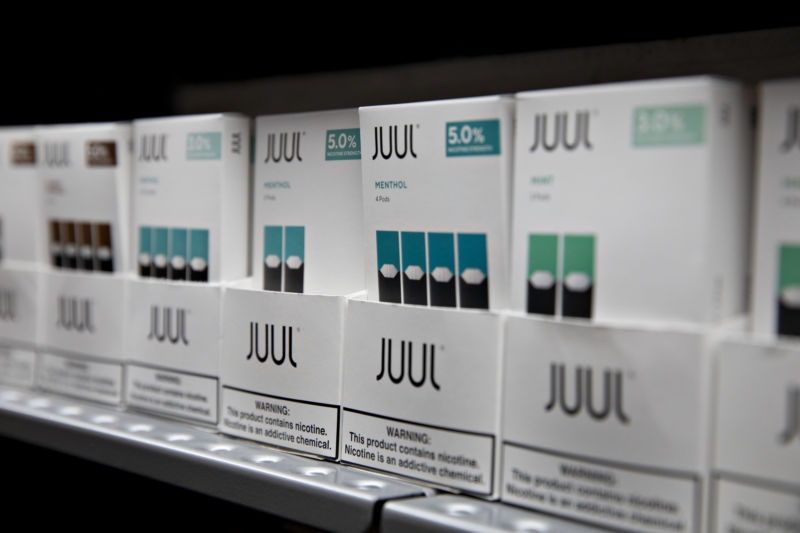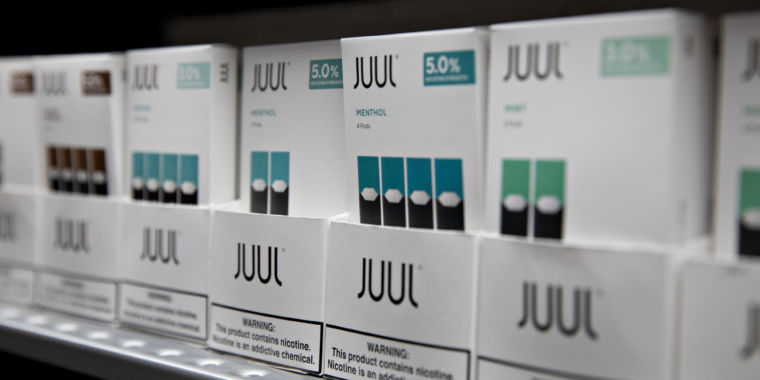
The Food and Drug Administration is reportedly preparing to deny approval of Juul’s tobacco and menthol flavored products, effectively driving the e-cigarette giant from the U.S. market, according to a report by The Wall Street Journal.
In its report, the Journal quoted unnamed people familiar with the case as saying the FDA could announce its denial as early as today, Wednesday, June 22.
If the report is correct, the move comes on the heels of an FDA announcement on Tuesday that the regulator is working on plans to set maximum nicotine levels for cigarettes and other burnt tobacco products. It is an action aimed at making the products less attractive to young people, less addictive and less deadly.
“Nicotine is highly addictive,” FDA Commissioner Robert Califf said in a statement. “The US Surgeon General has reported that 87 percent of adult smokers start smoking before age 18, and about two-thirds of adult daily smokers started smoking daily by age 18. Lowering nicotine levels to minimally addictive or non-addictive levels would decrease the likelihood of future generations of young people becoming addicted to cigarettes and help more smokers who are now addicted to quit.”
Juul has become infamous for its ties to youth vaping, and has soared to “epidemic” levels in recent years. Health advocates also argue that Juul has made its products more potent and addictive, increasing the risk of teens experimenting with vaping becoming addicted, possibly for life.
A 2019 Los Angeles Times investigation found that Juul brushed aside an idea from Camel cigarette maker RJ Reynolds to use nicotine salts and soothing chemicals so e-cigarette users can take deep puffs of high levels of nicotine. take without the risk of vomiting or burning their throats. Health researchers have also found that Juul aerosols can deliver significantly more nicotine than other tobacco products. In one study, rodents exposed to Juul aerosols had five to eight times higher levels of nicotine in their blood than after exposure to other e-cigarettes and cigarettes.
Vaping Epidemic
The higher nicotine levels are especially worrisome, as Juul is often accused of marketing its powerful products to underage youth. In 2015 and 2016, the company used young, trendy models in marketing materials and reportedly bought banner ads on websites aimed at teens and children, including Cartoon Network’s cartoonnetwork.com and Nickelodeon’s sites Nick.com and NickJr.com.
In the years that followed, both Juul’s profits and youth vaping increased. According to a Wells Fargo analysis of Nielsen data, Juul’s sales increased a whopping 783 percent to $942.6 million between 2017 and 2018. And according to the Centers for Disease Control and Prevention, the percentage of high school students reporting recent e-cigarette use has increased from 0.6 percent in 2011 to 10.5 percent in 2019. For high school students, use rose from 1 in that period. 5 percent to 27.5 percent .
As alarm grew about youth vaping trends, Juul announced in 2019 that it would end the sale of flavored products popular with young people, namely Mango, Fruit, Creme (creme brûlée) and Cucumber.
“We need to reset the vape category by gaining the trust of society and working with regulators, policy makers and stakeholders to fight underage use while providing an alternative for adult smokers,” said Juul’s CEO KC Crosthwaite at the time.
In 2020, the FDA banned sweet and fruity e-cigarette products and began reviewing vaping products, including Juul’s remaining products.
The Wall Street Journal noted that a Juul refusal would also be bad news for Altria, the maker of Marlboro, which paid $12.8 billion in 2018 for a 35 percent stake in Juul. The deal brought Juul’s value to about $35 billion, but its current value has dropped significantly. As of March 31, Altria valued its Juul stake at $1.6 billion.

